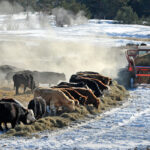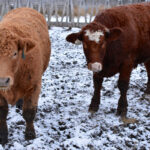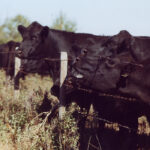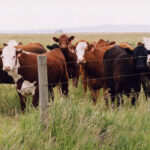China and the Philippines are joining South Korea in responding to the atypical case of BSE found in a Ponoka County, Alta., cow last month with suspensions of Canadian beef imports. Atypical BSE is a spontaneously occurring variant of the neurological disease, which affects older cattle, unlike the classic form of BSE that is linked […] Read more
Tag Archives BSE

China, Philippines suspend beef imports from Canada after BSE case
WINNIPEG, Manitoba, Jan 10 (Reuters) – China and the Philippines have suspended imports of Canadian beef due to Canada’s detection in December of a cow infected with bovine spongiform encephalopathy (BSE), a spokesperson for Canada’s agriculture department said on Monday. The moves follow an import suspension by South Korea last month, after Canada reported its […] Read more

BSE reaction limited to South Korea
The international reaction to a case of atypical BSE identified in an Alberta cow appears to be limited to South Korea’s restrictions on beef imports after news broke of the case more than two weeks ago. The Canadian Cattlemen’s Association and the Canadian Food Inspection Agency expect those restrictions to be short lived . Dennis […] Read more

South Korean BSE ban not expected to last long
The Canadian Cattlemen’s Association is downplaying news today that South Korea is restricting beef imports following the case of atypical BSE being found in Alberta last week. CCA executive vice-president Dennis Laycraft said the move stems from Canada’s particular export agreement with South Korea requiring verification of information of BSE cases by Seoul. “We would […] Read more

Chinese beef buyers expect Brazil trade to resume soon despite mad cow cases
BEIJING, Sept 6 (Reuters) – Chinese beef importers said on Monday the suspension of exports by top supplier Brazil due to two cases of mad cow disease has had no immediate market impact, with some still making purchases in anticipation of a quick resumption of trade. Brazil said on Saturday it had confirmed two cases […] Read more

Canada’s BSE nightmare officially ends
The BSE era in Canada is over. Eighteen years after a single domestic case closed international borders to Canadian beef and cattle, the World Organization for Animal Health, known as OIE, moved Canada from controlled risk to negligible risk status. That puts Canada on par with its trading partners and opens the door to improved […] Read more

Canada’s BSE status moves to negligible risk
Canada’s application for negligible risk status for BSE has been approved. The World Organization for Animal Health, known as the OIE, announced the change from controlled status today. Canada had applied for the designation through the voluntary process last summer. The change will mean improved beef and live cattle trade 18 years after the discovery […] Read more

Canada nears return to pre-2003 BSE status
World animal health organization to vote in May on negligible risk application, but scientific committee signals approval
Canada is closer to reaching negligible risk status for bovine spongiform encephalopathy, the illness that wreaked havoc in the cattle industry beginning in 2003 and still has repercussions today. If that status is achieved, it could lead to greater beef trade opportunities to countries that continue to restrict imports based on Canada’s BSE history. The […] Read more
Canada moves closer to improved BSE status
Canada is one step closer to reaching negligible risk status for bovine spongiform encephalopathy. The scientific committee of the World Organization for Animal Health has indicated Canada’s application for a change in BSE status, from controlled risk to negligible risk, fulfills the needed requirements. Canada was designated as a controlled risk country for BSE in […] Read more

Mexico will fully open to Canadian beef in October
Mexico says it will open its borders to the full range of Canadian beef effective Oct. 1, removing one of the last restrictions that were imposed after BSE was found in Canada in 2003. The announcement was made today by Mexican President Enrique Pena Nieto in a meeting with Prime Minister Justin Trudeau in Ottawa. […] Read more



